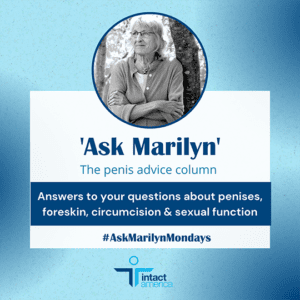 Dear Marilyn:
Dear Marilyn:
I’m a 35-year-old man. I have been having trouble with a very tight foreskin. My doctor says it’s phimosis, and the only treatment is circumcision. Is there any other remedy? I’d really like to keep my foreskin.
—Harold, New Orleans, LA
Dear Harold:
The word phimosis means muzzled, to indicate that the glans (head of the penis) is muzzled by the foreskin. At birth, most babies have “physiological phimosis,” a normal condition because the glans and foreskin have not yet separated. The foreskin separates from the glans over time, usually by adolescence.
Sometimes a retractable foreskin of an adult male will close down; this condition is called “pathological phimosis.” From your letter, I cannot determine why your foreskin has closed down, so I will suggest a number of possible causes and cures.
- Exposure to soap, shampoos, and chlorinated water in swimming pools or hot tubs can kill normal, beneficial bacteria on the foreskin, which can result in yeast overgrowth, inflammation, itching, and stinging with urination; it can also make the foreskin close down. This condition can be corrected by eliminating soap and shampoo, or by using barriers creams on the foreskin before swimming. To help the healing process. liquid Acidophilus culture purchased from the health food store or pharmacy can also be applied to the foreskin by pouring some of the liquid into the palm of the hand, dipping the foreskin into the solution, and letting it drip dry; do this six times a day for 3 or 4 days.
- Sometimes the foreskin will close down if a male has been too vigorous sexually, which can cause small tears in the foreskin. The opening will become tight while the tissue heals. Time and gentleness are the cure for this.
- Pathological phimosis can result from a condition called “lichen sclerosus” (formerly called “BXO”), characterized by the presence of small, shiny, and smooth white patches on the foreskin. These patches may become larger, and the skin may become itchy, thin, and wrinkled, and may tear easily and bleed. A dermatologist can diagnose lichen sclerosus, which is commonly treated with two creams, Clotrimazole and hydrocortisone, both available over-the-counter at your local pharmacy or by prescription, depending upon the desired strength.
- Finally, before considering circumcision, ask your urologist about a Y-V- or Z-plasty—a surgery in which small slits are cut in the foreskin, and then they are sewn together in a way that widens the opening. This surgery saves the foreskin and its specialized nerve endings that allow for full sexual sensations and enjoyment.
So, you can see, Harold, that finding the reason for your phimosis is a critical step to solving the problem and avoiding the loss of your foreskin.
—Marilyn





